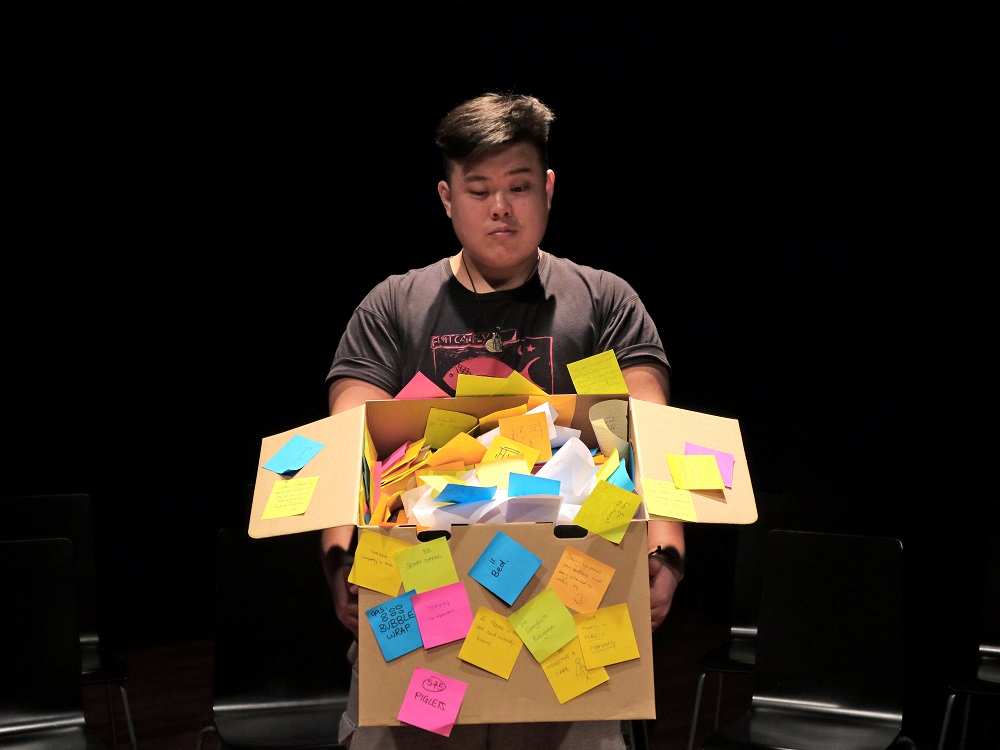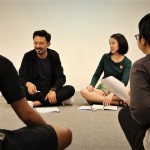When the going gets tough, it’s easy to lose sight of what makes life so great. The narrator in Duncan Macmillan and Jonny Donahoe’s play Every Brilliant Thing would know – his mum had tried to commit suicide when he was only six years old. In order to remind her that there’s always something worth living for, he began writing a list of brilliant things that exist in the world over the next 30 years of his life, with a little help from his audience.
The resulting piece was first staged in 2013 in the UK. Since then, it’s headed to America (where it had a stint at a theatre Off-Broadway in New York), Australia, New Zealand, and various cities around Europe. And now, Mohamad Shaifulbahri (aka Shaiful), the joint artistic director of the newly-formed Bhumi Collective, is bringing it to Singapore.
“I first heard about it in Edinburgh when it was running at the Fringe. A number of friends said it’s a show I should really watch, but I couldn’t get tickets to it. I got a copy of the play not long after and thought it’s, um, brilliant!” says Shaiful. “The story of someone young being a caregiver isn’t something we had previously addressed on stage, and most of the work that’s been put up has centred on those with mental health issues as opposed to those caring for them. I felt it’d be nice to have something from that perspective.”
The narrator is played by Andrew Marko, who had just won Best Actor at the recent M1-The Straits Times Life Theatre Awards for his performance in Pangdemonium’s Falling. We catch up with him to find out what his rehearsal process is like, why the audience shouldn’t be put off by the play’s interactive element, and what, exactly, makes Every Brilliant Thing so brilliant.
First off, you’ve had a couple of rehearsal sessions for Every Brilliant Thing at the time that we’re doing this interview – how are you feeling about the show right now?
I’m absolutely terrified and excited at the same time! The text is brilliant but also rather difficult because there are so many numbers that I have to memorise. It’s been challenging, but I’m very much looking forward to getting it going.
When did you first encounter Duncan Macmillan and Jonny Donahoe’s play, and what were your immediate thoughts about it?
I first encountered it a few months ago when Shaiful approached me with the idea of staging it. I thought it sounded really, really exciting. It’s one of those plays that manages to spread an important message while being extremely fun.
The play has been staged to rave reviews in both the UK and in America. What do you think makes it so appealing and endearing?
I think it’s the unpredictability of the show. You never know what’s going to happen, really. The level of improvisation just makes things exciting. Comedy aside, the play is also extremely honest and heartfelt. People always appreciate an honest story.
How do you rehearse for a play whose success depends as much on the audience as it does on the performer (who, of course, is also required to improvise)?
Well for a lot of the improv bits, Shaiful steps in to be the audience member and throws the best and the worst at me. We play out every possibility and try to find ways out of sticky situations that might arise.
Following on from that, a New York Times reviewer wrote: “Mr. Donahoe presides over [the show] as a host who is skilled in the art of disarming; he generates the illusion that he is somehow our acquaintance of long standing. He knows us well enough to tease us, it seems, but also likes us enough to keep us from making fools of ourselves.” Many theatregoers here aren’t necessarily huge fans of audience participation. Is it possible to practise putting people at ease?
Absolutely! I think the reason why people are so afraid of audience participation is because there is a very thick wall between the audience and the performer. It’s felt on both sides. But I’ve found that the important thing is to connect and engage with the audience before the play even begins. It breaks that wall very quickly.
Despite the cheery aspect of Every Brilliant Thing, the thing that lurks at the heart of the play is depression. From Yellow Chair Production’s Off-Centre to Pangdemonium’s Falling, you’ve been in quite a few productions that deal with mental health issues over the years. What are some lessons you learnt from researching and having conversations about these issues over the years?
I think the most important thing I’ve learnt is that everyone deserves a voice. Everyone deserves a chance to be treated like a friend. This world would be a lot better off if everyone chose love and kindness over hate and judgement.
Apart from Every Brilliant Thing, what else are you working on these days?
I’m trying to get through my last semester in school without failing everything. I’m also working on Electra with Cake Theatre as we are restaging it in KL in the first week of May. I’m also in the process of writing and recording an album with my band, Van Milos!
And lastly, what are some of the items that would be on your list of brilliant things?
- Plastic chairs that don’t break when you lean back on them
- Empty buses
- Perfectly scrambled eggs
- When you press the button for the elevator and it’s already on your floor so you don’t have to wait so long
- The Odeon Towers carpark after 5pm
- When you drop your phone on the floor but the screen doesn’t crack
- When you order a wrap at subway and the person making it doesn’t spill any of the ingredients when wrapping the wrap
- When free Wifi is actually free!
Interview by Gwen Pew on 10 April 2017
Find out more about Every Brilliant Thing here, and catch the show at Centre 42 from 18 – 23 April 2017.






